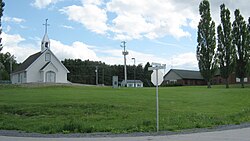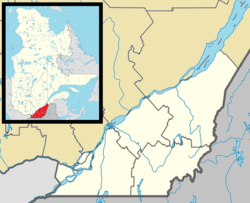world.wikisort.org - Canada
Wôlinak is an Abenaki First Nations reserve in the Centre-du-Québec region, Quebec, Canada. An enclave within the city of Bécancour, it was one of the Seven Nations of Canada.
Wôlinak | |
|---|---|
First Nations reserve | |
 Wôlinak village | |
 Location within Bécancour RCM. | |
 Wôlinak Location in southern Quebec. | |
| Coordinates: 46°19′N 72°25′W[1] | |
| Country | |
| Province | |
| Region | Centre-du-Québec |
| RCM | None |
| Constituted | unspecified |
| Government | |
| • Type | Band council |
| • Federal riding | Bas-Richelieu— Nicolet—Bécancour |
| • Prov. riding | Nicolet-Bécancour |
| Area | |
| • Total | 0.80 km2 (0.31 sq mi) |
| • Land | 0.74 km2 (0.29 sq mi) |
| Population (2021)[3] | |
| • Total | 194 |
| • Density | 262.8/km2 (681/sq mi) |
| • Pop 2016-2021 | |
| • Dwellings | 106 |
| Time zone | UTC−5 (EST) |
| • Summer (DST) | UTC−4 (EDT) |
| Area code | 450 |
| Highways | No major routes |
History
Around 1600, a few Abenaki families and Sokokis families established themselves on the Puante river (name given after a battle with the English colonists against the French colonists) which later, was given the name of Bécancour River from the name of M. de Bécancour, Baron de Portneuf, who was also established there.
From 600 inhabitants in the beginning, their numbers diminished after wars and epidemics.
See also
- Odanak
- Western Abenaki
- Seven Nations of Canada
References
- "Reference number 136958 in Banque de noms de lieux du Québec". toponymie.gouv.qc.ca (in French). Commission de toponymie du Québec.
- "Geographic code 38802 in the official Répertoire des municipalités". www.mamh.gouv.qc.ca (in French). Ministère des Affaires municipales et de l'Habitation.
- "Data table, Census Profile, 2021 Census of Population - Wôlinak, Indian reserve (IRI) [Census subdivision], Quebec". 9 February 2022.
External links
На других языках
[de] Wôlinak
Wôlinak ist ein Indianerreservat in der kanadischen Provinz Québec und liegt inmitten des Stadtgebiets von Bécancour. Das knapp 0,75 km² große Reservat Wôlinak Nr. 11 hatte im Jahr 2016 202 Bewohner indianischer Abstammung, zumeist Östliche Abenaki.- [en] Wôlinak
[ru] Волинак
Волинак (фр. Wôlinak) — индейская резервация алгонкиноязычного индейского народа абенаки, расположенная в административном регионе Центральный Квебек, Канада. Является одной из двух самоуправляемых территорий абенаков в пределах границ Канады, вторая — Оданак.Текст в блоке "Читать" взят с сайта "Википедия" и доступен по лицензии Creative Commons Attribution-ShareAlike; в отдельных случаях могут действовать дополнительные условия.
Другой контент может иметь иную лицензию. Перед использованием материалов сайта WikiSort.org внимательно изучите правила лицензирования конкретных элементов наполнения сайта.
Другой контент может иметь иную лицензию. Перед использованием материалов сайта WikiSort.org внимательно изучите правила лицензирования конкретных элементов наполнения сайта.
2019-2025
WikiSort.org - проект по пересортировке и дополнению контента Википедии
WikiSort.org - проект по пересортировке и дополнению контента Википедии